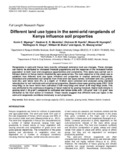Different land use types in the semi-arid rangelands of Kenya influence soil properties
Date
2011Author
Nyariki, Dickson M.
Mganga, K. Z.
Musimba, N. K. R.
Nyangito, M. M.
Ekaya, W. N.
Muiru, W. M.
Mwang’ombe, A. W.
Metadata
Show full item recordAbstract
Rangelands in semi-arid Kenya have recently witnessed extensive land use changes. These changes can mainly be attributed to increased livestock populations and the response of the increased human population to both local and exogenous opportunities and constraints. This study was carried out in Kibwezi district of Kenya mainly inhabited by agro-pastoralists. The main objective of this study was to establish how different land use types influence soil properties in tropical semi-arid rangelands. Disturbed and undisturbed soil samples from three land use types namely cultivated land (CL), grazing land (GL) and fallow land (FL) at a depth of 15-30cm were collected and analyzed using standard laboratories for soil nutrients and soil physical properties. Results show open grazing lands (CEC 19.59 meq/100g) to be more fertile than cultivated (13.88 meq/100g) and fallow (6.40 meq/100g) lands. This was attributed to the continuous dropping of faecal material by grazing livestock. Higher bulk density in grazing land (1.36 g/cm3) compared to cultivated and fallow lands with 1.29 g/cm3 and 1.33 g/cm3 was attributed to the hoof action of livestock. These results suggest that different land use types in the semi-arid rangelands contribute immensely to soil properties.
URI
http://hdl.handle.net/123456789/187http://www.academia.edu/6731717/Different_land_use_types_in_the_semi-arid_rangelands_of_Kenya_influence_soil_properties
Collections
- Journal Articles (BE) [333]

